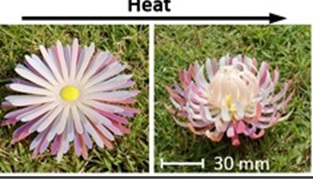
Saba Abdulghani Oliveira da Silva
CDRSP-IPLeiria, Portugal
Title: A framework of materials for 4d printing
Biography
Biography: Saba Abdulghani Oliveira da Silva
Abstract
4D printing is a term used in additive or direct digital manufacturing to describe a process in which a part is prepared with a particular form and then when stimulated by changes in temperature, humidity, light and pH transforms in to another shape. Such an approach is a revolutionary idea in manufacturing. The opportunities are endless. Figure 1 shows an example from the literature. For example object can be prepared to make manufacturing facile, transport costs minimal and then converted in to the finished object at the point of use. Clearly this technology has much to offer to medical devices and we can envisage an object which is printed in a form to make it easy to insert in to the body by, for example a hypodermic needle, which then at body temperature opens up in to a 3d structure to close an internal injury, implant a tissue for regenerative purposes or to deliver some therapeutic agent. In this presentation we present a framework for 4d printing which enables us to classify different types of shape or form changes. We review the stimuli driven materials available and hence the molecular mechanisms available to deliver 4D printing technology with temperature and light activation. We take examples from the literature and identify the most promising molecular mechanisms and identify the potential for applications.
This work is supported by the Fundação para a Ciência e a Tecnologia (FCT) through the Project references: UID/Multi/04044/2013; PAMI - ROTEIRO/0328/2013 (Nº 022158) and MATIS (CENTRO-01-0145-FEDER-000014 - 3362).

Figure 1: An example of a 4d printed structure which changes shape on heating. The flower is prepared from a shape memory polymer. Photo reproduced under a Creative Commons Attribution Non Commercial License 4.0 (CC BY-NC) from Zhen Ding, Chao Yuan, Xirui Peng, Tiejun Wang, H. Jerry Qi and Martin L. Dunn Science Advances 12 Apr 2017: Vol. 3, no. 4, e1602890 DOI: 10.1126/sciadv.1602890
Recent Publications
1. A. Sydney Gladma, Elisabetta A. Matsumoto, Ralph G. Nuzzo, L. Mahadevan & Jennifer A. Lewis. Nature Materials volume 15, pages 413–418 (2016).
2. Qi Ge, Amir Hosein Sakhaei, Howon Lee, Conner K. Dunn, Nicholas X. Fang, Martin L. SCIENTIFIC Reports 2016 6:31110 DOI: 10.1038/srep31110.
3. Morouço,P., Lattanzi, W., & Alves, N. (2017). 4D Bioprinting as a new era for tissue engineering and regenerative medicine. Frontiers in Bioengineering and Biotechnology, 5, 61.
4. Zhen Ding, Chao Yuan, Xirui Peng, Tiejun Wang, H. Jerry Qi2,† and Martin L. Dunn Science Advances 2017: Vol. 3, no. 4, e1602890 DOI: 10.1126/sciadv.1602890.
5. Steven K. Leist & Jack Zhou (2016) Current status of 4D printing technology and the potential of light-reactive smart materials as 4D printable materials, Virtual and Physical Prototyping, 11:4, 249-262, DOI: 10.1080/17452759.2016.119863.

